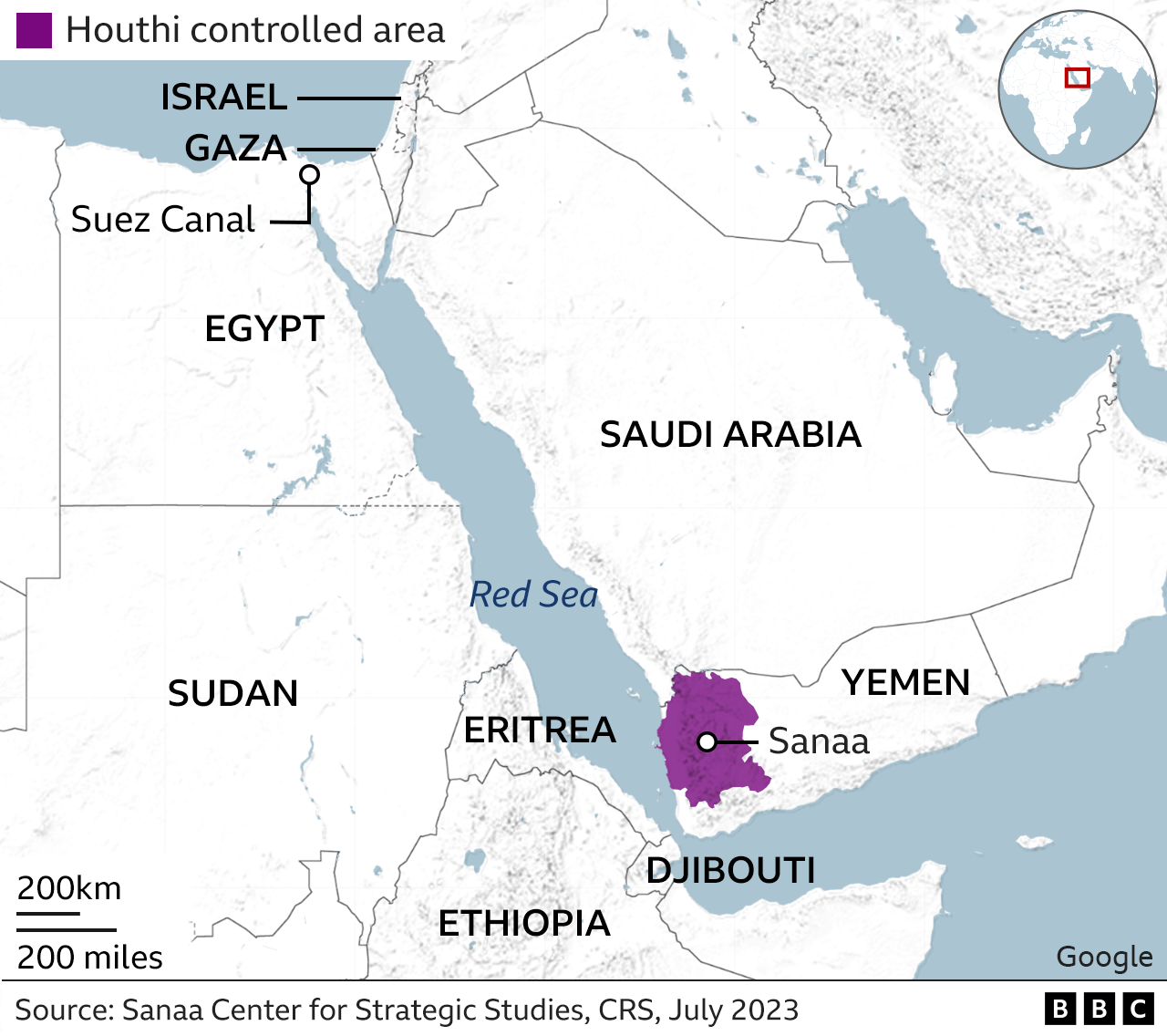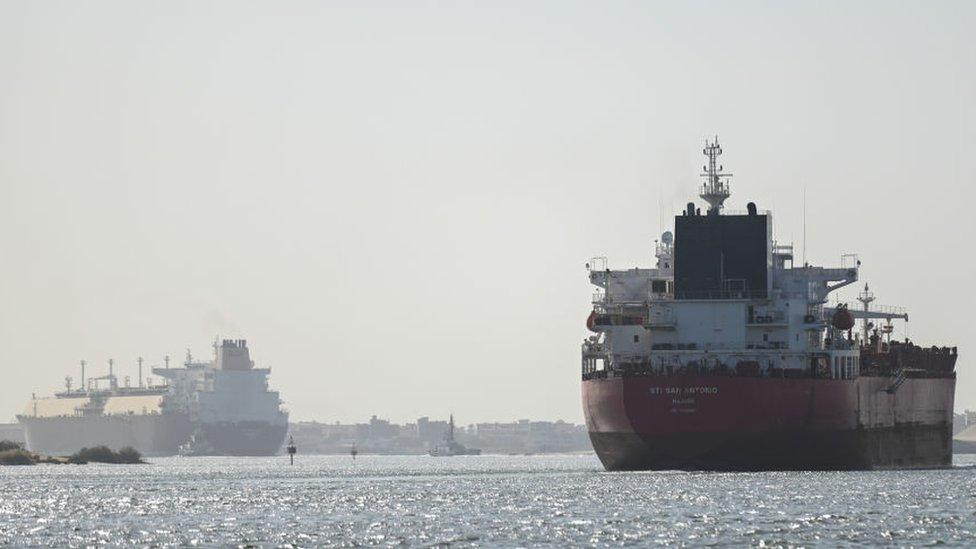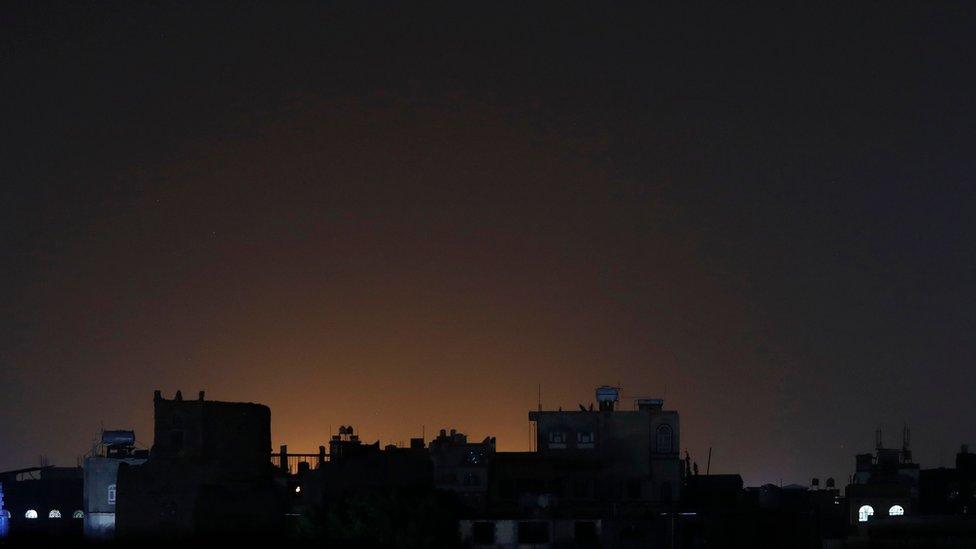Could the Houthis sabotage undersea cables?
- Published

The Houthis have been targeting ships in the Red Sea for several months
Revenge takes many forms. The Houthis in Yemen have made no secret of their determination to retaliate against the West for the US-led airstrikes that have been targeting their missile and drone launch sites.
These in turn have been in response to more than 30 Houthi attacks on international shipping in the Red Sea and Gulf of Aden, which they say is in support of the Palestinians in Gaza.
The stakes have now been raised.
Yemen's legitimate, UN-recognised government in Aden has warned that the Houthis, who seized much of Yemen in 2014, are now threatening to sabotage the crucial undersea communication cables, including internet lines, which run under the Red Sea - connecting Asia to Europe.
The warning came after a channel linked to the Houthis on the Telegram messaging app posted a map showing undersea cable routes in the Red Sea.
Could the Houthis sabotage these lines? They almost certainly would if they could.
The group has reportedly claimed that they have easily accessed maps showing the confluence of undersea communications cables running past their coastline, as they pass through the Bab al-Mandab Strait which, at its narrowest, is just 20 miles (32km) wide.
But the fibre cables, which carry 17% of the world's internet traffic, lie on the seabed mostly hundreds of metres below the surface - well beyond the reach of divers.
The US and Russia are both thought to have the naval capability to cut them. This involves deploying a deep-sea submersible from a mothership and then using what are, in effect, a giant pair of scissors for severing the cables on the ocean floor.
However, it would be more difficult for the Houthis to do.
"I assess it's a bluff, unless it's an attack on a terminal," former Royal Navy submarine commander Rear Adm John Gower says of the claims the group is threatening to sabotage the cables.
"It would need an ally with the capability, [someone with] a submersible plus the ability to locate [the cables]".
The Houthis do have an ally - Iran. With help from the Iranian Revolutionary Guard Corps and Hezbollah of Lebanon, the Houthis have built up a formidable arsenal of missiles and drones.
Over the past eight years they have fired these at Saudi Arabia, the UAE, Israel, US and British warships - as well as any vessel they suspect of links to Israel, the US or UK.
So, could Iran enable the Houthis to cut the undersea cables?
"There is nothing I've seen in the Iranian orbat (Order of Battle) that could touch these cables, certainly not their submarines," says former Royal Navy Cdr Tom Sharpe.
"Diving is an option but it's deep and busy so I think it would be pushing it," he says. Concurring with Rear Adm Gower, Cdr Sharpe says: "I think this is a bluff."

For Iran to enable an ally to sabotage the world's undersea internet cables would also be a risky move on Tehran's part.
Neither Iran nor the US want to get into a full-scale war with each other and they have made that clear.
The current conflict between the US and Iran's proxies and allies around the Middle East is calibrated to a degree. The US gave several days' warning before hitting Iran-backed militia bases in Iraq and Syria, allowing key personnel to evacuate.
Cutting global communications cables would be a major escalation that could even result in retaliatory strikes on Iran itself.
"Iran would be nervous about expanding their global disruption campaign [to shipping]," says Edmund Fitton-Brown, who was the UK ambassador to Yemen from 2015-2017.
"The Iranians might resort to cyber options sooner than sabotage of infrastructure," he adds.
In conclusion, the threat made recently by the Houthis on their Telegram channel would be hard to carry out.
It would be both technically challenging and politically risky for Iran, whose hand the West sees in all the Houthi attacks in the Red Sea.
But the Houthis have surprised their adversaries before - firing missiles at a Saudi oil depot in Jeddah just before a Formula 1 Grand Prix in 2022.
They have also survived nearly eight years of intensive air strikes by a Saudi-led coalition that has failed to reverse their illegal takeover.
And today, despite repeated US-led air strikes on their missile and drone bases, they are showing no signs of backing down in their standoff with the West.
The Houthis, who are loathed and feared by many Yemenis in the areas outside their control, have become a force to be reckoned with.
Related topics
- Published6 February 2024

- Published5 February 2024

- Published1 February 2024
